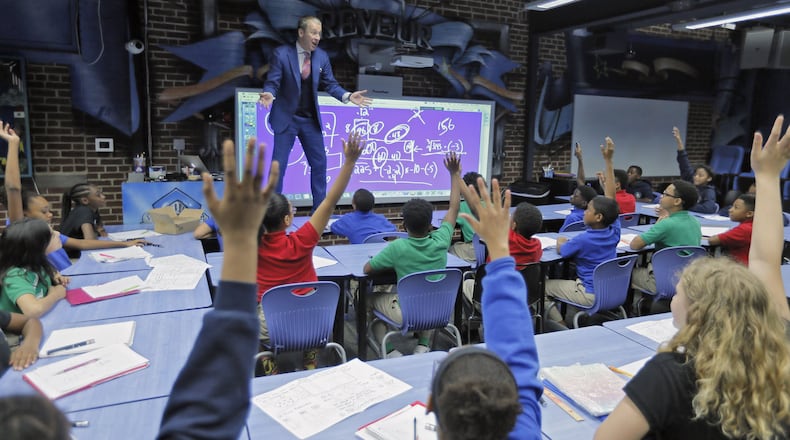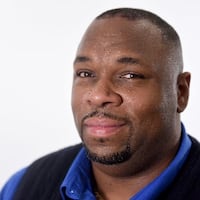A bookshelf at the end of a second-floor hallway at Atlanta’s Ron Clark Academy slides away, like a cover to a secret passageway in a whodunit novel. On the other side, Ron Clark stands at a Promethean whiteboard, his arms outstretched as he sways to music piping through speakers around the room.
The students, about 30 or so, follow his every move.
“What’s the area?” he asks, using American Sign Language.
He signs. They answer. He writes what they say on the board. Another question. He signs, they answer and he writes again. He jumps onto the desk of a petite fifth-grader at the front. She doesn’t flinch, as she and other students expect a little dance from Clark on their desks when he notices a correct answer.
It’s a math lesson. Students are trying to determine the area of a trapezoid that’s part of a larger triangle.
Many might argue that the private school launched in 2007 — and in the news recently because of viral videos, including one of a red-carpet event for incoming fifth-graders — has more than fulfilled its mission to produce some of the nation's top students, while also showing teachers from other schools how to better engage their charges.
But Clark isn’t satisfied. He’s hoping to one day expand the campus to accommodate more children and more visiting educators.
"We always feel like we haven't done enough," he said.
Clark and Kim Bearden, who founded the academy that currently has about 120 students in grades five through eight, said all of their graduates finish high school, and 99 percent of them graduate from college. By comparison, Atlanta Public Schools' high school graduation rate fell to 71.5 percent in 2016. And of the 2,184 students who graduated from APS high Schools in 2011, only about 14 percent are known to have received a postsecondary degree by 2016, according to the Governor's Office of Student Achievement.
Teacher training visits account for 80 percent of Ron Clark Academy’s total revenue, Clark said. About 12,000 educators have visited this year alone, each one paying $425 daily to be immersed in the school’s culture — observing classrooms, participating in lessons, even sliding down the blue two-story slide near the entrance. (Clark said traditional education is like taking the stairs, and the slide represents his school’s approach to education.)
Visiting educators — more than 40,000 thus far — have come to Atlanta from as far away as Australia to learn the RCA way.
Credit: Bob Andres
Credit: Bob Andres
Bill McAllister said he had a healthy level of skepticism when he first visited the academy in 2008 with a handful of teachers from West Holt Public Schools, a rural Nebraska school district where he was superintendent.
In the first class they observed, Clark was teaching math that McAllister thought was too advanced for the children. Clark asked a question and focused on one student. After about five minutes, the girl admitted she didn’t know the answer.
“I think every teacher in there figured he was being too hard on her,” said McAllister, who has been superintendent for the past two years at West Point Public Schools, about an hour outside Omaha. “I thought she was never going to answer a question again. But two questions later, her hand was back up.”
He has sent about 80 teachers to Atlanta in the past two years. And those visits have paid off, he said, citing better teacher engagement with students and higher test scores.
“It shows teachers and staff what energy and passion look like,” McAllister said. “I think most teachers do the best they can with what their knowledge is. It’s amazing to see when people … come to realize they can up their expectations of students.”
Credit: Bob Andres
Credit: Bob Andres
Annual tuition at Ron Clark Academy is $18,000, but only a handful of families pay that.
“The majority pay $45 a month,” Clark said, thanks to the money generated by teacher training visits, as well as corporate and philanthropic donations.
The history of the academy, and its founders, is a rock star’s tale among educators. Clark met Bearden in 2000 when both were recognized by Disney as top educators from across the country. Clark was working at a school in Harlem with mostly low-income students. Bearden worked for Cobb County Schools. They bonded over a mutual dream to fashion a learning lab of sorts to teach educators how to better interact with their students.
Credit: Bob Andres
Credit: Bob Andres
Clark moved to Atlanta in 2004 after writing a successful book backed by Oprah Winfrey, and used the proceeds from his book sales to make his and Bearden’s dream a reality.
They purchased a boarded-up factory in southeast Atlanta in 2005. Two years later, that building became their school.
“We try to find solutions to challenges. … We show teachers how to go deeper,” Bearden said.
“Our teachers put so much passion into what they’re doing,” said eighth-grader Ayzia Alexander.
After graduation, she’ll attend high school at the George School in Philadelphia, whose notable alumni include the late civil rights activist Julian Bond and actress Blythe Danner.
Literature and composition teacher Pamela Haskins’ first experience with Ron Clark Academy came as a parent. While her son was a student, she suggested ways to improve the school’s composition offerings and was invited to give a lesson to the staff.
Two weeks later, she was offered a job.
“Everybody brings their A-plus game,” she said of the staff. “This is the most efficient team I’ve been part of. Here, I feel like I have to run twice as fast to keep up with the demands of the students.”
She said it’s a challenge she gladly accepts.
About the Author
Keep Reading
The Latest
Featured






